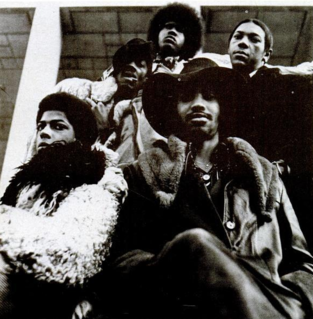
Funkadelic was an American funk rock band formed in Plainfield, New Jersey in 1968 and active until 1982. The band and its sister act Parliament, both led by George Clinton, pioneered the funk music culture of the 1970s. Initially formed as a backing band for Clinton's vocal group the Parliaments, Funkadelic eventually pursued a heavier, more psychedelic rock-oriented sound. They released acclaimed albums such as Maggot Brain (1971) and One Nation Under a Groove (1978).
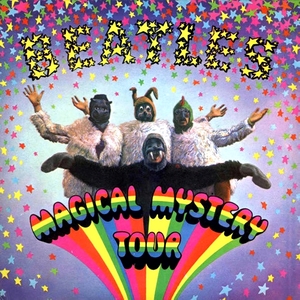
Magical Mystery Tour is a record by the English rock band the Beatles that was released as a double EP in the United Kingdom and an LP in the United States. It includes the soundtrack to the 1967 television film of the same name. The EP was issued in the UK on 8 December 1967 on the Parlophone label, while the Capitol Records LP release in the US and Canada occurred on 27 November and features an additional five songs that were originally released as singles that year. In 1976, Parlophone released the eleven-track LP in the UK.
Ellen McIlwaine was an American-born singer-songwriter and musician best known for her career as a solo singer, songwriter and slide guitarist.
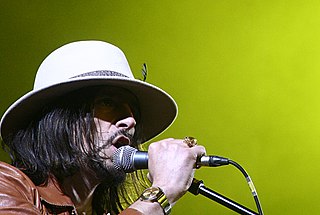
The Future Sound of London is a British electronic music duo composed of Garry Cobain and Brian Dougans. Described as a "boundary-pushing" electronic act, covering techno, ambient, house music, trip hop, psychedelia, and dub.

Porcupine Tree are an English rock band formed by musician Steven Wilson in 1987. During an initial career spanning more than twenty years, they earned critical acclaim from critics and fellow musicians, developed a cult following, and became an influence for new artists. The group carved out a career at a certain distance away from mainstream music, being described by publications such as Classic Rock and PopMatters as "the most important band you’d never heard of".

The Top is the fifth studio album by English rock band The Cure, released on 4 May 1984 by Fiction Records. The album entered the UK Albums Chart at number ten on 12 May. Shortly after its release, the Cure embarked on a major tour of the United Kingdom, culminating in a three-night residency at the Hammersmith Odeon in London.
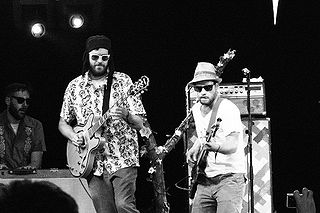
Dr. Dog is an American rock band based in Philadelphia, Pennsylvania, United States. Its lineup consists of Toby Leaman, Scott McMicken, Frank McElroy, Zach Miller (keyboard), Eric Slick (drums), and Michael Libramento. Lead vocal duties are shared between Leaman and McMicken, with all members contributing harmonies. In addition, each band member has a nickname beginning with the letter T, and they have explained that friends of the band also receive nicknames, which are drawn from aspects of their lives and personalities.

Without a Net is a recording of the Grateful Dead in concert. It compiles performances from October 1989 to April 1990, and was released in September 1990. The album simulates the progression of an actual Grateful Dead concert and was certified Gold by the RIAA in November 1990.
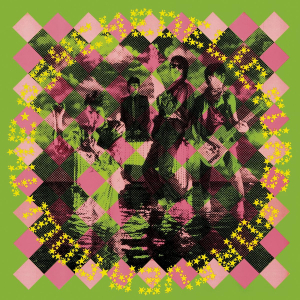
Forever Now is the third studio album by English rock band the Psychedelic Furs. The 10-song album, including the hit single "Love My Way", was recorded in the spring of 1982 and released on 25 September of that year by Columbia/CBS. A 20th-anniversary reissue included six related bonus tracks.
Rockfour is a psychedelic rock band, formed in 1988 in Holon, Israel. Most of their catalog is in English, and they regularly tour the United States.

The Head Shop is an American psychedelic rock band from New York that released one eponymous album on Epic in 1969. The album cover features a swirling group of multi-colored boxes that surround a black-and-white image of a shrunken head. The back cover is mostly black with minimal copy but also includes a shot of the band lit from beneath.
Psychedelic pop is pop music that contains musical characteristics associated with psychedelic music. Developing in the late 1960s, elements included "trippy" features such as fuzz guitars, tape manipulation, backwards recording, sitars, and Beach Boys-style harmonies, wedded to melodic songs with tight song structures. The style lasted into the early 1970s. It has seen revivals in subsequent decades by neo-psychedelic artists.
Fear Itself was a short-lived psychedelic blues-rock band formed by Ellen McIlwaine in the late 1960s in Atlanta, Georgia. The band featured McIlwaine on lead vocals and playing harmonica, rhythm guitar and organ. Chris Zaloom played lead guitar, and Bill McCord was on drums. Steve Cook played bass guitar and was the bassist on the band's one album, the self-titled Fear Itself. However, Cook left, and was replaced by Paul Album on bass.

Honky Tonk Angel is the 1972 debut solo album by Ellen McIlwaine, following her departure from Fear Itself. The first side of the album contains songs that were recorded live at The Bitter End in New York City while side two of the record is made up of studio recordings.

We the People is a 1973 album by Ellen McIlwaine.
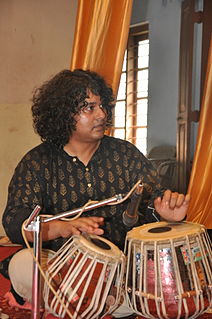
Cassius Khan, is a Canadian Indian classical musician known for playing the Tabla while singing.
Stoner rock, also known as stoner metal or stoner doom, is a rock music fusion genre that combines elements of doom metal with psychedelic rock and acid rock. The genre emerged during the early 1990s and was pioneered foremost by Kyuss and Sleep.
Woodstock Sound-Outs or soundouts were mini-festivals held outside Woodstock, NY from 1967 to 1970. They were the brainchild of John "Jocko" Moffitt, a roofer and drummer. He had heard about a number of folk festivals in his native California, and he wanted to stage a rock festival in a country setting. Planning for the event began in 1966 and by the early spring of 1967 performers like Richie Havens were being tentatively booked.
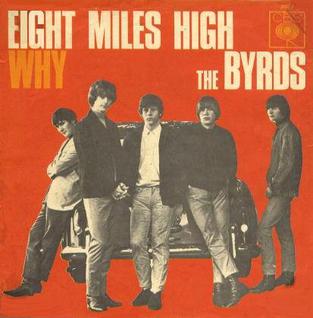
"Why" is a song by the American rock band the Byrds, written by Jim McGuinn and David Crosby and first released as the B-side of the band's "Eight Miles High" single in March 1966. The song was re-recorded in December 1966 and released for a second time as part of the band's Younger Than Yesterday album.













